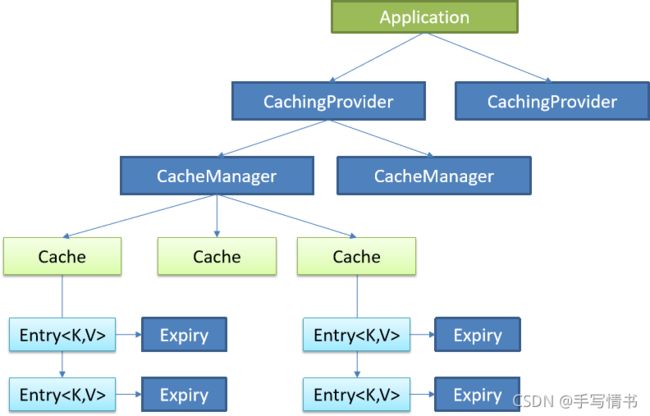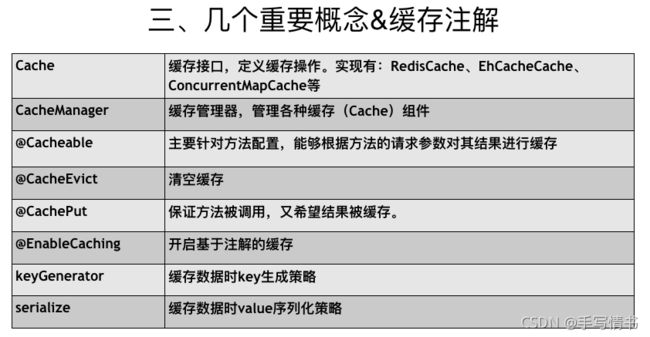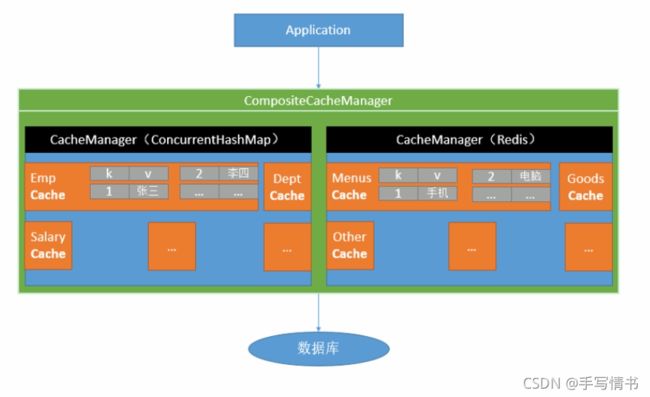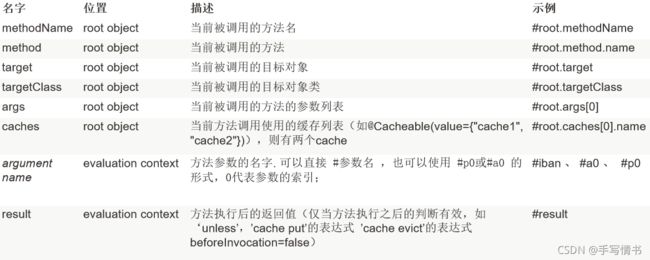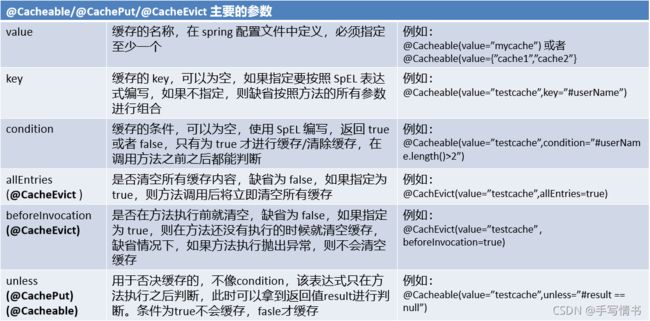springBoot整合篇~~~springBoot快速整合cache
springboot整合cache(使用redis中间件)
1.1JSR107缓存
Java Caching定义了5个核心接口,分别是CachingProvider, CacheManager, Cache, Entry 和 Expiry。
CachingProvider定义了创建、配置、获取、管理和控制多个CacheManager。一个应用可以在运行期访问多个CachingProvider。
CacheManager定义了创建、配置、获取、管理和控制多个唯一命名的Cache,这些Cache存在于CacheManager的上下文中。一个CacheManager仅被一个CachingProvider所拥有。
Cache是一个类似Map的数据结构并临时存储以Key为索引的值。一个Cache仅被一个CacheManager所拥有。
Entry是一个存储在Cache中的key-value对。
Expiry 每一个存储在Cache中的条目有一个定义的有效期。一旦超过这个时间,条目为过期的状态。一旦过期,条目将不可访问、更新和删除。缓存有效期可以通过ExpiryPolicy设置。
JSR107缓存需要导包
javax.cache
cache-api
1.2 spring抽象缓存
@Cacheable注解加载方法中,那么该方法第一次会查询数据库,然后就会吧数据放在缓存中,使用Cache 进行数据的读取等操作。
@CacheEvict删除缓存,例如根据id删除用户,那么也要删除缓存中的用户信息
@CachePut更新缓存,例如更新用户信息后,同时也要更新缓存中的用户信息
Spring从3.1开始定义了org.springframework.cache.Cache 和org.springframework.cache.CacheManager接口来统一不同的缓存技术;
并支持使用JCache(JSR-107)注解简化我们开发;
• Cache接口为缓存的组件规范定义,包含缓存的各种操作集合;
• Cache接口下Spring提供了各种xxxCache的实现;如RedisCache,EhCacheCache ,ConcurrentMapCache等;• 每次调用需要缓存功能的方法时,Spring会检查检查指定参数的指定的目标方法是否 已经被调用过;如果有就直接从缓存中获取方法调用后的结果,
如果没有就调用方法 并缓存结果后返回给用户。下次调用直接从缓存中获取。
• 使用Spring缓存抽象时我们需要关注以下两点;
1)确定方法需要被缓存以及他们的缓存策略
2)从缓存中读取之前缓存存储的数据
常见参数
1.3代码整合
1.3.1 实体类
package com.itheima.bean;
import lombok.AllArgsConstructor;
import lombok.Getter;
import lombok.NoArgsConstructor;
import lombok.Setter;
import lombok.ToString;
import java.io.Serializable;
@Getter
@Setter
@ToString
@NoArgsConstructor
@AllArgsConstructor
public class Department implements Serializable {
private static final long serialVersionUID = 2311461422582382654L;
private Integer id;
private String departmentName;
}
package com.itheima.bean;
import lombok.AllArgsConstructor;
import lombok.Getter;
import lombok.NoArgsConstructor;
import lombok.Setter;
import lombok.ToString;
import java.io.Serializable;
@Getter
@Setter
@ToString
@NoArgsConstructor
@AllArgsConstructor
public class Employee implements Serializable {
private static final long serialVersionUID = 959420245225757073L;
private Integer id;
private String lastName;
private String email;
private String gender; //性别 1男 0女
private Integer dId;
}
1.3.2持久层
package com.itheima.mapper;
import com.itheima.bean.Employee;
import org.apache.ibatis.annotations.*;
@Mapper
public interface EmployeeMapper {
@Select("SELECT * FROM employee WHERE id = #{id}")
public Employee getEmpById(Integer id);
@Update("UPDATE employee SET last_name=#{lastName},email=#{email},gender=#{gender},d_id=#{dId} WHERE id=#{id}")
public void updateEmp(Employee employee);
@Delete("DELETE FROM employee WHERE id=#{id}")
public void deleteEmpById(Integer id);
@Insert("INSERT INTO employee(last_name,email,gender,d_id) VALUES(#{lastName},#{email},#{gender},#{dId})")
public void insertEmployee(Employee employee);
@Select("SELECT * FROM employee WHERE lastName = #{lastName}")
Employee getEmpByLastName(String lastName);
}
package com.itheima.mapper;
import com.itheima.bean.Department;
import org.apache.ibatis.annotations.Mapper;
import org.apache.ibatis.annotations.Select;
@Mapper
public interface DepartmentMapper {
@Select("SELECT * FROM department WHERE id = #{id}")
Department getDeptById(Integer id);
}
1.3.3逻辑层
package com.itheima.service;
import com.itheima.bean.Employee;
public interface EmployeeService {
public Employee getEmp(Integer id);
public Employee updateEmp(Employee employee);
public void deleteEmp(Integer id);
public Employee getEmpByLastName(String lastName);
}
package com.itheima.service;
import com.itheima.bean.Department;
public interface DeptService {
Department getDeptById(Integer id);
}
package com.itheima.service;
import com.itheima.bean.Employee;
import com.itheima.mapper.EmployeeMapper;
import org.springframework.beans.factory.annotation.Autowired;
import org.springframework.cache.annotation.CacheConfig;
import org.springframework.cache.annotation.CacheEvict;
import org.springframework.cache.annotation.CachePut;
import org.springframework.cache.annotation.Cacheable;
import org.springframework.cache.annotation.Caching;
import org.springframework.stereotype.Service;
//@CacheConfig(cacheNames="emp"/*,cacheManager = "employeeCacheManager"*/) //抽取缓存的公共配置
@Service
public class EmployeeServiceImpl implements EmployeeService {
@Autowired
EmployeeMapper employeeMapper;
/**
* 将方法的运行结果进行缓存;以后再要相同的数据,直接从缓存中获取,不用调用方法;
* CacheManager管理多个Cache组件的,对缓存的真正CRUD操作在Cache组件中,每一个缓存组件有自己唯一一个名字;
*
*
* 原理:
* 1、自动配置类;CacheAutoConfiguration
* 2、缓存的配置类
* org.springframework.boot.autoconfigure.cache.GenericCacheConfiguration
* org.springframework.boot.autoconfigure.cache.JCacheCacheConfiguration
* org.springframework.boot.autoconfigure.cache.EhCacheCacheConfiguration
* org.springframework.boot.autoconfigure.cache.HazelcastCacheConfiguration
* org.springframework.boot.autoconfigure.cache.InfinispanCacheConfiguration
* org.springframework.boot.autoconfigure.cache.CouchbaseCacheConfiguration
* org.springframework.boot.autoconfigure.cache.RedisCacheConfiguration
* org.springframework.boot.autoconfigure.cache.CaffeineCacheConfiguration
* org.springframework.boot.autoconfigure.cache.GuavaCacheConfiguration
* org.springframework.boot.autoconfigure.cache.SimpleCacheConfiguration【默认】
* org.springframework.boot.autoconfigure.cache.NoOpCacheConfiguration
* 3、哪个配置类默认生效:SimpleCacheConfiguration;
*
* 4、给容器中注册了一个CacheManager:ConcurrentMapCacheManager
* 5、可以获取和创建ConcurrentMapCache类型的缓存组件;他的作用将数据保存在ConcurrentMap中;
*
* 运行流程:
* @Cacheable:
* 1、方法运行之前,先去查询Cache(缓存组件),按照cacheNames指定的名字获取;
* (CacheManager先获取相应的缓存),第一次获取缓存如果没有Cache组件会自动创建。
* 2、去Cache中查找缓存的内容,使用一个key,默认就是方法的参数;
* key是按照某种策略生成的;默认是使用keyGenerator生成的,默认使用SimpleKeyGenerator生成key;
* SimpleKeyGenerator生成key的默认策略;
* 如果没有参数;key=new SimpleKey();
* 如果有一个参数:key=参数的值
* 如果有多个参数:key=new SimpleKey(params);
* 3、没有查到缓存就调用目标方法;
* 4、将目标方法返回的结果,放进缓存中
*
* @Cacheable标注的方法执行之前先来检查缓存中有没有这个数据,默认按照参数的值作为key去查询缓存,
* 如果没有就运行方法并将结果放入缓存;以后再来调用就可以直接使用缓存中的数据;
*
* 核心:
* 1)、使用CacheManager【ConcurrentMapCacheManager】按照名字得到Cache【ConcurrentMapCache】组件
* 2)、key使用keyGenerator生成的,默认是SimpleKeyGenerator
*
*
* 几个属性:
* cacheNames/value:指定缓存组件的名字;将方法的返回结果放在哪个缓存中,是数组的方式,可以指定多个缓存;
*
* key:缓存数据使用的key;可以用它来指定。默认是使用方法参数的值 1-方法的返回值
* 编写SpEL; #i d;参数id的值 #a0 #p0 #root.args[0]
* getEmp[2]
*
* keyGenerator:key的生成器;可以自己指定key的生成器的组件id
* key/keyGenerator:二选一使用;
*
*
* cacheManager:指定缓存管理器;或者cacheResolver指定获取解析器
*
* condition:指定符合条件的情况下才缓存;
* ,condition = "#id>0"
* condition = "#a0>1":第一个参数的值》1的时候才进行缓存
*
* unless:否定缓存;当unless指定的条件为true,方法的返回值就不会被缓存;可以获取到结果进行判断
* unless = "#result == null"
* unless = "#a0==2":如果第一个参数的值是2,结果不缓存;
* sync:是否使用异步模式
* @param id
* @return
*
*/
@Cacheable(value = {"emp"}/*,keyGenerator = "myKeyGenerator",condition = "#a0>1",unless = "#a0==2"*/)
public Employee getEmp(Integer id){
System.out.println("查询"+id+"号员工");
Employee emp = employeeMapper.getEmpById(id);
return emp;
}
/**
* @CachePut:既调用方法,又更新缓存数据;同步更新缓存
* 修改了数据库的某个数据,同时更新缓存;
* 运行时机:
* 1、先调用目标方法
* 2、将目标方法的结果缓存起来
*
* 测试步骤:
* 1、查询1号员工;查到的结果会放在缓存中;
* key:1 value:lastName:张三
* 2、以后查询还是之前的结果
* 3、更新1号员工;【lastName:zhangsan;gender:0】
* 将方法的返回值也放进缓存了;
* key:传入的employee对象 值:返回的employee对象;
* 4、查询1号员工?
* 应该是更新后的员工;
* key = "#employee.id":使用传入的参数的员工id;
* key = "#result.id":使用返回后的id
* @Cacheable的key是不能用#result
* 为什么是没更新前的?【1号员工没有在缓存中更新】
*
*/
@CachePut(/*value = "emp",*/key = "#result.id")
public Employee updateEmp(Employee employee){
System.out.println("updateEmp:"+employee);
employeeMapper.updateEmp(employee);
return employee;
}
/**
* @CacheEvict:缓存清除
* key:指定要清除的数据
* allEntries = true:指定清除这个缓存中所有的数据
* beforeInvocation = false:缓存的清除是否在方法之前执行
* 默认代表缓存清除操作是在方法执行之后执行;如果出现异常缓存就不会清除
*
* beforeInvocation = true:
* 代表清除缓存操作是在方法运行之前执行,无论方法是否出现异常,缓存都清除
*
*
*/
@CacheEvict(value="emp",beforeInvocation = true/*key = "#id",*/)
public void deleteEmp(Integer id){
System.out.println("deleteEmp:"+id);
//employeeMapper.deleteEmpById(id);
int i = 10/0;
}
/**
@Caching 定义复杂的缓存规则
**/
@Caching(
cacheable = {
@Cacheable(/*value="emp",*/key = "#lastName")
},
put = {
@CachePut(/*value="emp",*/key = "#result.id"),
@CachePut(/*value="emp",*/key = "#result.email")
},
evict = {
}
)
public Employee getEmpByLastName(String lastName){
return employeeMapper.getEmpByLastName(lastName);
}
}
package com.itheima.service;
import com.itheima.bean.Department;
import com.itheima.mapper.DepartmentMapper;
import org.springframework.beans.factory.annotation.Autowired;
import org.springframework.beans.factory.annotation.Qualifier;
import org.springframework.cache.Cache;
import org.springframework.cache.annotation.Cacheable;
import org.springframework.data.redis.cache.RedisCacheManager;
import org.springframework.stereotype.Service;
@Service
public class DeptServiceImpl implements DeptService {
@Autowired
private DepartmentMapper departmentMapper;
@Cacheable(cacheNames = "dept",cacheManager = "cacheManager")
public Department getDeptById(Integer id){
return departmentMapper.getDeptById(id);
}
}
1.3.4表现层
package com.itheima.controller;
import com.itheima.bean.Employee;
import com.itheima.service.EmployeeService;
import org.springframework.beans.factory.annotation.Autowired;
import org.springframework.web.bind.annotation.GetMapping;
import org.springframework.web.bind.annotation.PathVariable;
import org.springframework.web.bind.annotation.RestController;
@RestController
public class EmployeeController {
@Autowired
private EmployeeService employeeService;
@GetMapping("/emp/{id}")
public Employee getEmployee(@PathVariable("id") Integer id){
return employeeService.getEmp(id);
}
@GetMapping("/emp")
public Employee update(Employee employee){
return employeeService.updateEmp(employee);
}
@GetMapping("/delemp")
public String deleteEmp(Integer id){
employeeService.deleteEmp(id);
return "success";
}
@GetMapping("/emp/lastname/{lastName}")
public Employee getEmpByLastName(@PathVariable("lastName") String lastName){
return employeeService.getEmpByLastName(lastName);
}
}
package com.itheima.controller;
import com.itheima.bean.Department;
import com.itheima.service.DeptServiceImpl;
import org.springframework.beans.factory.annotation.Autowired;
import org.springframework.web.bind.annotation.GetMapping;
import org.springframework.web.bind.annotation.PathVariable;
import org.springframework.web.bind.annotation.RestController;
@RestController
public class DeptController {
@Autowired
private DeptServiceImpl deptService;
@GetMapping("/dept/{id}")
public Department getDept(@PathVariable("id") Integer id){
return deptService.getDeptById(id);
}
}
1.3.5配置层
package com.itheima.config;
import org.springframework.cache.interceptor.KeyGenerator;
import org.springframework.context.annotation.Bean;
import org.springframework.context.annotation.Configuration;
import java.lang.reflect.Method;
import java.util.Arrays;
@Configuration
public class MyCacheConfig {
@Bean("myKeyGenerator")
public KeyGenerator keyGenerator(){
return new KeyGenerator(){
@Override
public Object generate(Object target, Method method, Object... params) {
return method.getName()+"-->["+ Arrays.asList(params).toString()+"]";
}
};
}
}
package com.itheima.config;
import com.fasterxml.jackson.annotation.JsonAutoDetect;
import com.fasterxml.jackson.annotation.PropertyAccessor;
import com.fasterxml.jackson.databind.ObjectMapper;
import org.springframework.context.annotation.Bean;
import org.springframework.context.annotation.Configuration;
import org.springframework.data.redis.cache.RedisCacheManager;
import org.springframework.data.redis.connection.RedisConnectionFactory;
import org.springframework.data.redis.core.RedisTemplate;
import org.springframework.data.redis.serializer.Jackson2JsonRedisSerializer;
@Configuration
public class MyRedisConfig {
/**
* redisTemplate 序列化使用的jdkSerializeable, 存储二进制字节码, 所以自定义序列化类
* @param redisConnectionFactory
* @return
*/
@Bean
public RedisTemplate<Object, Object> redisTemplate(RedisConnectionFactory redisConnectionFactory) {
RedisTemplate<Object, Object> redisTemplate = new RedisTemplate<>();
redisTemplate.setConnectionFactory(redisConnectionFactory);
// 使用Jackson2JsonRedisSerialize 替换默认序列化
Jackson2JsonRedisSerializer jackson2JsonRedisSerializer = new Jackson2JsonRedisSerializer(Object.class);
ObjectMapper objectMapper = new ObjectMapper();
objectMapper.setVisibility(PropertyAccessor.ALL, JsonAutoDetect.Visibility.ANY);
objectMapper.enableDefaultTyping(ObjectMapper.DefaultTyping.NON_FINAL);
jackson2JsonRedisSerializer.setObjectMapper(objectMapper);
// 设置value的序列化规则和 key的序列化规则
redisTemplate.setKeySerializer(jackson2JsonRedisSerializer );
redisTemplate.setValueSerializer(jackson2JsonRedisSerializer);
redisTemplate.afterPropertiesSet();
return redisTemplate;
}
@Bean(value = "cacheManager")
public RedisCacheManager cacheManager(RedisTemplate<Object, Object> redisTemplate){
RedisCacheManager cacheManager = new RedisCacheManager(redisTemplate);
//key多了一个前缀
//使用前缀,默认会将CacheName作为key的前缀
cacheManager.setUsePrefix(true);
return cacheManager;
}
}
1.3.6启动类及其配置文件
package com.itheima;
import org.mybatis.spring.annotation.MapperScan;
import org.springframework.boot.SpringApplication;
import org.springframework.boot.autoconfigure.SpringBootApplication;
import org.springframework.cache.annotation.EnableCaching;
/**
* 一、搭建基本环境
* 1、导入数据库文件 创建出department和employee表
* 2、创建javaBean封装数据
* 3、整合MyBatis操作数据库
* 1.配置数据源信息
* 2.使用注解版的MyBatis;
* 1)、@MapperScan指定需要扫描的mapper接口所在的包
* 二、快速体验缓存
* 步骤:
* 1、开启基于注解的缓存 @EnableCaching
* 2、标注缓存注解即可
* @Cacheable
* @CacheEvict
* @CachePut
* 默认使用的是ConcurrentMapCacheManager==ConcurrentMapCache;将数据保存在 ConcurrentMap中
* 开发中使用缓存中间件;redis、memcached、ehcache;
* 三、整合redis作为缓存
* Redis 是一个开源(BSD许可)的,内存中的数据结构存储系统,它可以用作数据库、缓存和消息中间件。
* 1、安装redis:使用docker;
* 2、引入redis的starter
* 3、配置redis
* 4、测试缓存
* 原理:CacheManager===Cache 缓存组件来实际给缓存中存取数据
* 1)、引入redis的starter,容器中保存的是 RedisCacheManager;
* 2)、RedisCacheManager 帮我们创建 RedisCache 来作为缓存组件;RedisCache通过操作redis缓存数据的
* 3)、默认保存数据 k-v 都是Object;利用序列化保存;如何保存为json
* 1、引入了redis的starter,cacheManager变为 RedisCacheManager;
* 2、默认创建的 RedisCacheManager 操作redis的时候使用的是 RedisTemplate
* 3、RedisTemplate 是 默认使用jdk的序列化机制
* 4)、自定义CacheManager;
*
*/
@MapperScan("com.itheima.mapper")
@SpringBootApplication
@EnableCaching
public class DemoApplication {
public static void main(String[] args) {
SpringApplication.run(DemoApplication.class, args);
}
}
spring:
datasource:
username: root
password: root
url: jdbc:mysql://localhost:3306/spring_cache?characterEncoding=utf8&useSSL=false
redis:
host: localhost
mybatis:
configuration:
map-underscore-to-camel-case: true
global-config:
refresh-mapper: true
#驼峰下划线转换
column-underline: true
logging:
level:
com:
itheima:
mapper: debug
debug: true
server:
port: 3333
1.3.8 sql文件
/*
Navicat Premium Data Transfer
Source Server : 本地数据库
Source Server Type : MySQL
Source Server Version : 50723
Source Host : localhost:3306
Source Schema : spring_cache
Target Server Type : MySQL
Target Server Version : 50723
File Encoding : 65001
Date: 27/10/2021 17:46:57
*/
SET NAMES utf8mb4;
SET FOREIGN_KEY_CHECKS = 0;
-- ----------------------------
-- Table structure for department
-- ----------------------------
DROP TABLE IF EXISTS `department`;
CREATE TABLE `department` (
`id` int(11) NOT NULL AUTO_INCREMENT,
`departmentName` varchar(50) CHARACTER SET utf8mb4 COLLATE utf8mb4_general_ci NULL DEFAULT NULL,
PRIMARY KEY (`id`) USING BTREE
) ENGINE = InnoDB AUTO_INCREMENT = 4 CHARACTER SET = utf8mb4 COLLATE = utf8mb4_general_ci ROW_FORMAT = Dynamic;
-- ----------------------------
-- Records of department
-- ----------------------------
INSERT INTO `department` VALUES (1, '开发部');
INSERT INTO `department` VALUES (2, '人事部');
INSERT INTO `department` VALUES (3, '管理部');
-- ----------------------------
-- Table structure for employee
-- ----------------------------
DROP TABLE IF EXISTS `employee`;
CREATE TABLE `employee` (
`id` int(11) NOT NULL AUTO_INCREMENT,
`last_name` varchar(50) CHARACTER SET utf8mb4 COLLATE utf8mb4_general_ci NULL DEFAULT NULL COMMENT '名字',
`email` varchar(50) CHARACTER SET utf8mb4 COLLATE utf8mb4_general_ci NULL DEFAULT NULL COMMENT '邮箱',
`gender` varchar(10) CHARACTER SET utf8mb4 COLLATE utf8mb4_general_ci NULL DEFAULT NULL COMMENT '性别',
`dId` int(11) NULL DEFAULT NULL COMMENT '部门id',
PRIMARY KEY (`id`) USING BTREE
) ENGINE = InnoDB AUTO_INCREMENT = 10 CHARACTER SET = utf8mb4 COLLATE = utf8mb4_general_ci ROW_FORMAT = Dynamic;
-- ----------------------------
-- Records of employee
-- ----------------------------
INSERT INTO `employee` VALUES (1, 'jack', '[email protected]', '男', 1);
INSERT INTO `employee` VALUES (2, '李484四', '[email protected]', '女', 1);
INSERT INTO `employee` VALUES (3, '王五4874', '[email protected]', '男', 2);
INSERT INTO `employee` VALUES (4, '王五', '[email protected]', '女', 1);
INSERT INTO `employee` VALUES (5, '王刘148', '[email protected]', '男', 1);
INSERT INTO `employee` VALUES (6, '王8', '[email protected]', '男', 3);
INSERT INTO `employee` VALUES (7, '王五48574', '[email protected]', '女', 1);
INSERT INTO `employee` VALUES (8, '王刘', '[email protected]', '男', 2);
INSERT INTO `employee` VALUES (9, '王8', '[email protected]', '男', 1);
SET FOREIGN_KEY_CHECKS = 1;
1.3.9 maven依赖
UTF-8
UTF-8
1.8
org.springframework.boot
spring-boot-starter-web
org.springframework.boot
spring-boot-devtools
org.springframework.boot
spring-boot-starter-cache
org.springframework.boot
spring-boot-starter-data-redis
org.mybatis.spring.boot
mybatis-spring-boot-starter
1.3.2
mysql
mysql-connector-java
runtime
org.springframework.boot
spring-boot-starter-test
test
org.projectlombok
lombok
1.18.20
provided
org.springframework.boot
spring-boot-maven-plugin
org.springframework.boot
spring-boot-starter-test
test
org.projectlombok
lombok
1.18.20
provided
org.springframework.boot
spring-boot-maven-plugin
